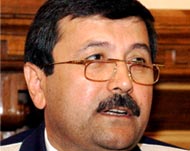New explosion rocks Uzbek capital
A new explosion struck an outlying district of the Uzbek capital Tashkent on Wednesday, after two days of attacks left more than 40 people dead in Washington’s key ally in the region.

The blast occurred in southwestern Tashkent and according to the Interfax news agency caused an undetermined amount of casualties.
“There was an explosion in an ordinary house in the street,” one bystander told an AFP reporter on the scene. “I think police officers were chasing about four people.”
“There was shooting and then two booms,” said another resident, Aziz.
Police cordoned off the area, in Tashkent’s historic Sabidrakhimovsky neighbourhood, and were not allowing anyone through.
Scores detained
The blast came after Uzbek authorities reportedly detained 30
people on suspicion of involvement in a series of attacks that
shook Tashkent and the ancient city of Bukhara on Monday and Tuesday.
Prosecutor General Rashid Kadyrov told the ITAR-TASS news agency that 30 people had been detained on Wednesday.
Amid tightened security, police and troops with automatic machineguns were out in force in Tashkent, schools and universities were ordered to remain closed, and the border with Tajikistan remained shut for a second day.
The attacks were mostly directed against police targets and were the deadliest to hit the former Soviet republic – a key US ally whose hardline leaders have for years waged a campaign against insurgents. They were also the first to be carried out by female bombers.
The capital bore the brunt of the attacks, including a spectacular siege between police and suspected insurgents near the president’s residence, two blasts in the city centre and car bombings at two police checkpoints on the outskirts.
Authorities have blamed insurgents for the attacks and rights activists feared a backlash against Muslims in the country.
Clampdown
“Our concern is that we’re going to see the same kind of intensification of massive sweeps of peaceful Muslim dissidents, as we saw after 1999,” said Acacia Shields, of US-based Human Rights Watch.
|
“Our concern is that we’re going to see the same kind of intensification of massive sweeps of peaceful Muslim dissidents, as we saw after 1999” Acacia Shields, |
She referred to the last attacks to hit Uzbekistan, when a wave of explosions in Tashkent killed 16 people.
They were blamed on the Islamic Movement of Uzbekistan (IMU), which was then based in Afghanistan under the protection of the since ousted Taliban.
After the 1999 attacks, police rounded up hundreds of Muslims, often accusing them of being members of Hizb al-Tahrir, a group that advocates peacefully setting up an Islamic state and is banned across Central Asia.
Amnesty International
Amnesty International has also condemned Uzbekistan’s human rights record, calling on the country to stop executing dozens of people annually without giving them access to a proper justice system.
The rights group also called on the former Soviet state to end its use of the death penalty.
|
Executing people was irresponsible “where torture is systematic, corruption is unchecked at every stage … and where (Uzbek) courts apply the death penalty without the guidance of objective and publicly accessible sentencing criteria” |
It said executing people was irresponsible “where torture is systematic, corruption is unchecked at every stage … and where courts apply the death penalty without the guidance of objective and publicly accessible sentencing criteria”.
In February 2004, a woman whose son was allegedly boiled to death in an Uzbek prison was herself jailed on charges of religious extremism and plotting against the state.
The verdict was immediately condemned as politically motivated.
Last year, Fatima Mukadyrova displayed post-mortem photographs of her son – showing smashed teeth and nails torn off. His body had been cut, bruised and scalded.
US support
US Secretary of State Colin Powell called his Uzbek counterpart Sadyk Safayev on Tuesday to offer US help in the probe into the attacks, the State Department said in Washington.
 |
|
Uzbek official Rashid Kadyrov |
Powell “offered US assistance in the investigation and the minister expressed appreciation for the offer,” spokesman Richard Boucher told reporters. “Our embassy in Uzbekistan will be following up in more detail with them.”
Boucher could not offer details on what the US help might entail.
Nor could he provide any US assessment on who or what group might be responsible for the two days of attacks that Tashkent has blamed on insurgents.
Uzbekistan became a US ally after the 11 September attacks in 2001, opening up its main military base to US troops fighting in neighbouring Afghanistan.
Uzbek officials had said they suspected the involvement of Hizb al-Tahrir in this week’s wave of violence. But in a statement issued in London, the group said it “denies any involvement whatsoever in today’s explosions.”
Hizb al-Tahrir has no history of violence.